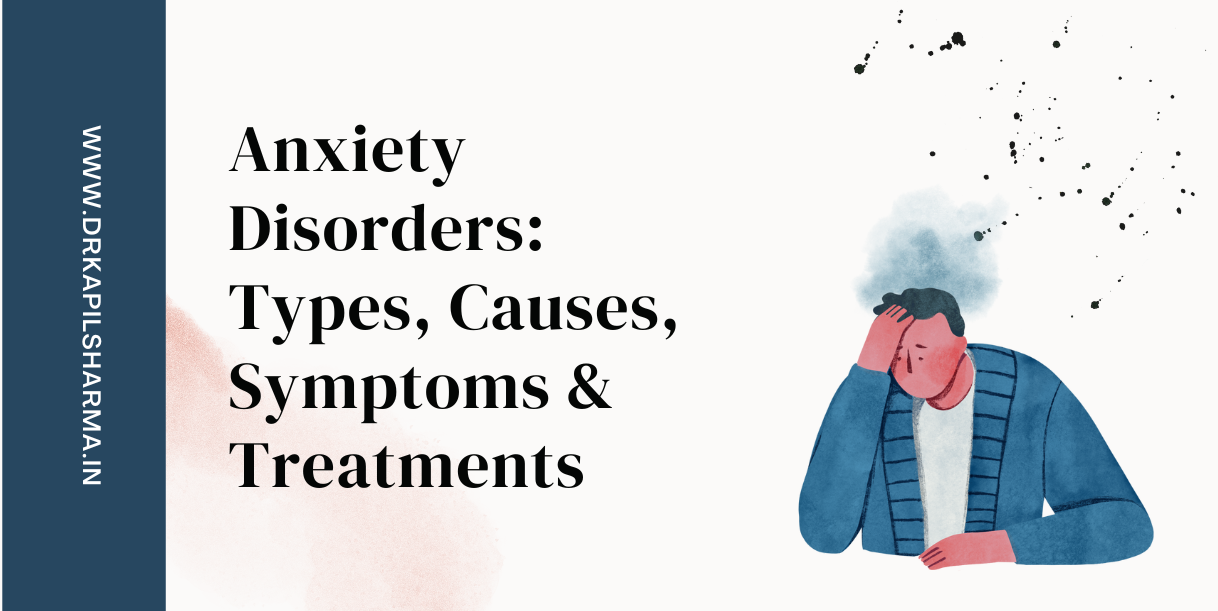
Anxiety Disorders: Types, Causes, Symptoms & Treatments
Some people are more prone to experiencing anxiety disorders than others. When it comes to this, some of the things that play a part are heredity, personality, and environment. So there is no definite answer for who will or won’t have an anxiety disorder. If you experience symptoms like sleeplessness, panic attacks, stomach pain, trouble concentrating or thinking clearly, chest pain and more then you might be diagnosed with an anxiety disorders.
What are Anxiety Disorders?
Anxiety disorders are a group of conditions that cause people significant distress or impairment in their everyday lives. They can include panic disorder, post-traumatic stress disorder (PTSD), social anxiety disorder, and obsessive-compulsive disorder (OCD).
There is no one “cause” of anxiety disorders, but they can be caused by various factors, including genetic and environmental factors.
Most anxiety disorders are long-term conditions that may last for years or even a lifetime. However, many people improve dramatically with treatment.
What are the Types of Anxiety Disorders?
There are six types of anxiety disorders: panic disorder, PTSD, social anxiety disorder, OCD, generalized anxiety disorder (GAD), and specific phobia.
Panic Disorder: People with panic disorder experience intense fear and worry that they will have a heart attack, stroke, or other serious medical event. They often feel like they’re going to die or have a seizure. Panic attacks may be sudden and unexpected, or they may come over time.
PTSD: People with PTSD experience intense fear and worry about recurring events that cause physical or emotional trauma.
Symptoms of Anxiety Disorders
Anxiety disorders are a group of mental illnesses that affect millions of people in the United States. Anxiety disorders can be quite serious and can cause a lot of problems in your life. Symptoms of anxiety disorders can vary from person to person, but some common symptoms include: nervousness, trembling, feeling hot or cold, feeling like you can’t breathe, trouble sleeping, and headaches.
There are many different types of anxiety disorders, but the most common ones are general anxiety disorder (GAD), social anxiety disorder (SAD), and panic disorder. GAD is the most common type of anxiety disorder, affecting about 20% of Americans. SAD is more common in women than men and is characterized by intense fear or anxiety around social situations such as making a speech or meeting new people. Panic disorder is the most severe type of anxiety disorder and affects about 7% of Americans. People with panic disorder experience intense fears that trigger episodes of chest pain, shortness of breath, or feelings of doom.
There is no one cause for any type of anxiety disorder, but there are a few things that may be associated with an increased risk for developing an anxiety disorder.
Causes and Risk Factors of Anxiety Disorders
Anxiety disorders are a group of mental health conditions characterized by anxiety and related symptoms, such as panic attacks, trouble sleeping, and excessive worry. The cause of anxiety disorders is unknown, but there are many risk factors that can increase your chances of developing an anxiety disorder. Here are some of the most common causes of anxiety disorders:
– genetics. Some people are more likely to develop anxiety disorders than others, and there is no known cure for these conditions. However, there are things you can do to reduce your risk, including seeking out genetic counseling if you have a family history of anxiety disorders.
– lifestyle factors. Factors like diet and exercise can affect your overall mood and body chemistry, which can lead to anxiety symptoms. Make sure to get enough exercise and avoid excess weight gain or weight loss. Also, keep in mind what you eat – too much sugar, caffeine, or processed foods can contribute to anxiety problems.
– stressors in your life. Constant stress can lead to an elevated level of cortisol – a hormone that’s responsible for stress responses – in your body. This increase in cortisol can lead to increased levels of anxiety symptoms.
Diagnosis and Treatment for Anxiety Disorders
Anxiety disorders are a group of mental health conditions that cause people to experience excessive anxiety and worry. People can have one or more anxiety disorders, which can be diagnosed by a doctor. There are many types of anxiety disorders, and each has its own set of symptoms. Some of the most common anxiety disorders include panic disorder, generalized anxiety disorder, social anxiety disorder, obsessive-compulsive disorder, and post-traumatic stress disorder.
There is no one cause for anxiety disorders, but they can often be traced back to a traumatic event or series of events that caused intense fear or stress in the person with the condition. Anxiety disorders often occur along with other mental health conditions, such as depression or substance abuse. Treatment for an anxiety disorder typically includes medication and/or therapy. Therapy may involve counseling or therapy groups. Medications used to treat anxiety disorders often work by relieving symptoms and preventing them from returning. You can also contact to the best psychiatrist in Jaipur, Dr Kapil Sharma.
Conclusion
Anxiety disorders are a group of mental health conditions that can cause significant distress and impairment. They can be broadly classified into two categories: general anxiety disorders and specific anxiety disorders. General anxiety disorder is the most common type and includes conditions like generalized social phobia, panic disorder, and agoraphobia. Specific anxiety disorder refers to conditions like obsessive-compulsive disorder (OCD), post-traumatic stress disorder (PTSD), and specific phobias. In this article, we will discuss the different types of anxiety disorders, their causes, and some symptoms to watch out for. Hopefully, this information will help you understand your condition better and find the best treatment options available.

